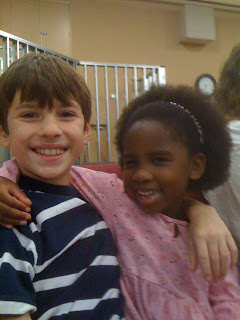There are three basic steps to thinking; input, processing, and output. At any one of these points, learning can break down. Maybe the child inputs the wrong information. They may have low reading comprehension, visual or auditory processing issues, or maybe just difficulty paying attention. In the same way, processing the information could be the issue, but in my daughter's case, her main area of struggle comes to output. I can often see in her face that light bulb flash and I know she's got it! Then she tries to explain (output is an EXTREMELY important part of learning) and the words jumble out. It's okay. We are patient and we just give her the time she needs to answer. Such an easy accommodation...until HE shows up!!!
Enter the younger brother...Tristan (who also has FASD)! Now I don't want to paint T-Rex as a villain (don't let the villainous mustache fool you...he really does LOVE his sister), but being that he's a sharp kid and incredibly competitive, he takes constant delight in answering questions posed to Aniah before she is able to formulate an answer. Now, we've always been open in regards to talking with our kids about their disability. We don't want them to use it as a crutch or an excuse for behavior, but we do want them to understand the obstacles they need to contend with.
No matter what difficulty your child is having, be frank and loving. If your kid has trouble with behavior for example, tell them how proud you are of their effort (you're being truthful) even when they struggle and how you'll always continue to help them make better decisions. Praise their effort, but don't pretend it never happened. My daughter will always struggle academically, but I want her to face her struggle head on and be a fighter!
If I pretend like her difficulty doesn't exist or go to the other extreme of insulating/excusing/allowing everything due to her disability, I'm doing her a disservice. I'm never going to be a fan of sugar coating life, but I know I can help her and my other children by being honest, working through their problems (modeling problem solving too) and choosing my words carefully throughout the whole process. Choosing my words carefully was a good strategy for her and a good strategy for us as well.


No comments:
Post a Comment